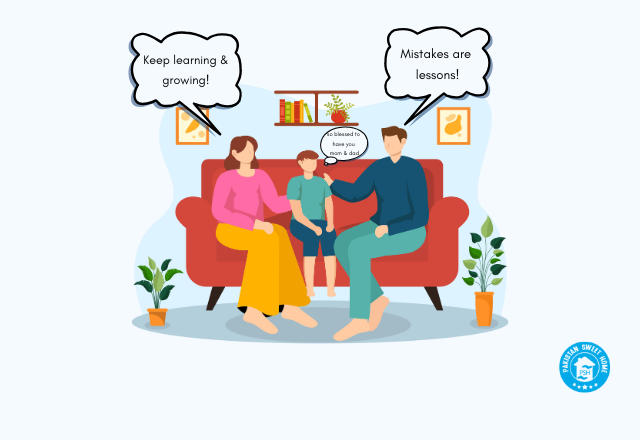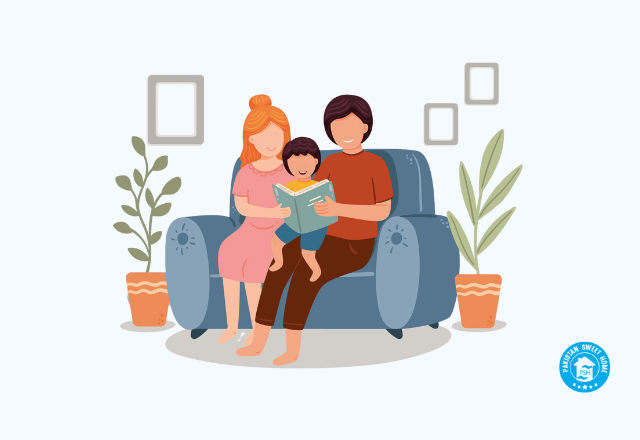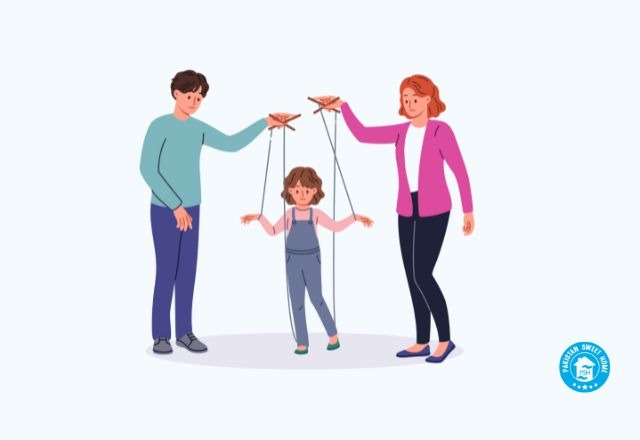
- DONATE
- SPONSOR A CHILD
- Zakat calculator
- SIGN IN
-
- About Us
- FAQ's
- Contact
- Get Involved
- Admissions
- Sign In
- SPONSOR A CHILD ZAKAT CALCULATOR DONATE
-
info@pakistansweethome.org.pk
(051) 4865856
+92 335 1118477
Raising a child without understanding your parenting style can lead to confusion, frustration, and unintentional mistakes.
You try your best, yet sometimes feel like you're either too strict or too lenient. And just when you think you've found your groove, another challenge leaves you second-guessing your approach.
The key lies in recognizing your parenting style and learning how it shapes your child’s growth.
Let’s explore the various types of parenting, how parents can adjust their style, and which one works best.
In the 1960s, psychologist Diana Baumrind identified three parenting styles: authoritarian, authoritative, and permissive. She based these styles on how demanding and responsive parents are toward their children’s behavior. Later on, researchers introduced a fourth category, known as neglectful or uninvolved parenting, to further expand the framework. |
Authoritative parenting is often seen as the best because it balances warmth, rules, and flexibility. Parents maintain clear authority but foster an open and supportive environment. Children raised this way know their limits because rules are clear and reasons are explained calmly.
Although children are encouraged to express their views, the final decisions lie with the parents. This parenting approach promotes strong, nurturing bonds between parents and children.
Children who have a stable environment often develop into self-assured, emotionally intelligent individuals who are both responsible and independent. They also tend to be sociable, inquisitive, and motivated to succeed.
In managing homework, authoritative parents provide a structured yet supportive approach. They set aside a quiet time and place for homework, but also show interest in their child’s progress.
For instance, a parent might say, “I know you’re working hard on your math homework. Do you need any help, or do you want to give it a try on your own first?”
They encourage their child to ask questions and discuss what they’ve learned, fostering independence while providing guidance. As a result, children tend to have strong study habits and a positive attitude towards learning.
Authoritarian parenting means having strict rules and using punishment to control a child’s behavior. These parents maintain firm standards and rarely allow for flexibility.
In some cases, children may be unaware of certain rules until they are disciplined for violating them. Authoritarian parents have high expectations, and children raised in such environments often follow rules and demonstrate obedient behavior.
They may develop a fear of punishment and have limited opportunities to practice independent decision-making. This can lead to challenges later in life, such as poor social skills, difficulty in making autonomous choices, or even rebellious tendencies.
Authoritarian parents take a strict, controlling approach to homework. They impose rigid rules, such as specific study times with little room for flexibility.
For example, if a child struggles with math, the parent might say, “Finish it now, no matter how long it takes.”
There’s little to no discussion or encouragement of the child’s opinions. The focus is solely on performance, and mistakes are often met with criticism. This can lead to stress, frustration, and a lack of motivation for the child to do schoolwork.
Permissive parents often take pride in maintaining a close, friendly relationship with their children. They are warm, emotionally supportive, and maintain open lines of communication.
While they are attentive to their children’s emotional needs, they generally set few rules and rarely enforce discipline. These parents allow their children to make their own choices but frequently intervene to rescue them when things go wrong.
Children with permissive parents often choose what to eat, when to sleep, and whether to do homework or not. This freedom can boost self-confidence and social skills, but may also cause impulsiveness and poor self-discipline.
Permissive parents protect their children from failure, which can leave them unready for adult challenges.
In managing homework, permissive parents tend to be lenient and give their children a lot of freedom. They might not enforce a regular homework schedule and often let the child decide when and how to complete their assignments.
For instance, the parent might say, “It’s up to you when you do your homework; just let me know if you need anything.”
Children aren’t pressured to finish work, which can lead to delays and poor time management. While the child may feel supported emotionally, they may struggle with responsibility and deadlines.
Uninvolved or Neglectful parents may meet their child's basic needs, but often fail to provide emotional support or engage with the child. These parents typically offer limited nurturing, set few expectations, and impose minimal boundaries.
This behavior can happen without planning and is often caused by stress, work, or family problems. Children raised by neglectful parents often become resilient and independent out of necessity.
However, they may have trouble managing emotions, coping effectively, and building strong social connections. These children may develop low self-esteem and be more prone to seeking out unsuitable role models.
Neglectful parents show little to no involvement in managing homework. A child might be left to complete assignments on their own, without any help or guidance. If the child asks for assistance, the parent might say, “Figure it out yourself,” or simply ignore the request.
There’s no supervision or checking to see if the homework is being completed. This lack of involvement can make the child feel unsupported and neglect their schoolwork. As a result, they may fall behind academically, often unaware of the consequences of their actions.
Beyond the main four, several other parenting styles offer unique approaches to raising children.
Free-range parents encourage their children to have more independence. They allow them to be unsupervised or minimally supervised in public. For many years, this parenting style was considered neglectful, with critics arguing that it put children at risk.
But in recent years, some states like Utah have passed laws that support this hands-off style. For example, Utah changed the meaning of neglect, so activities like walking to school aren't seen as risky. Advocates of free-range parenting believe it fosters qualities like self-reliance and resilience in children.
Helicopter parents are often overprotective, feeling the need to control nearly every aspect of their child’s life. These parents tend to be highly involved. They frequently step in to manage successes and failures on behalf of their children. Their tendency to constantly monitor and intervene is often driven by anxiety and fear.
Research from the American Psychological Association shows that children of helicopter parents may struggle with emotional regulation. This makes it harder for them to develop essential life skills like confidence and self-sufficiency.
Snowplow parents (also known as lawnmower or bulldozer parents) remove obstacles and cater to their children's needs. These parents mean well and want to protect their children, but this can stop them from learning to handle challenges.
When taken to the extreme, this parenting style can lead to anxiety and unrealistic expectations. An example of this is the college admissions scandal, where celebrity parents bribed universities for spots.
Lighthouse parenting is a more balanced approach that emphasizes providing guidance and support while also offering independence.
The term, introduced by pediatrician Kenneth Ginsburg in his book Raising Kids to Thrive, compares parents to lighthouses. Lighthouses are stable and reliable sources of support, guiding children without controlling their every move.
The goal is to balance love, protection, and communication while empowering children to make their own decisions and face challenges.
Attachment parenting is characterized by a nurturing, hands-on approach. Parents who follow this style focus on their child’s needs, believing it fosters independence and emotional stability.
They value physical closeness, practices like co-sleeping and extended breastfeeding, and a positive, discipline-focused approach. Research by the American Academy of Pediatrics shows that responsive parenting helps children develop stronger language skills.
However, this approach can feel overwhelming when parents become too rigid or demanding in maintaining attachment.
Tiger parents are known for their rigid, demanding nature. They expect obedience and success, often placing intense pressure on their children to excel.
This approach gained attention from Amy Chua’s book, Battle Hymn of the Tiger Mom. It describes the authoritarian parenting method that is common in Chinese culture. Research shows that tiger parenting can increase anxiety in children as they try to meet high expectations.
Panda parenting promotes independence by allowing children to learn through exploration and by making their own decisions.
This approach offers gentle guidance, encourages problem-solving and creativity, and provides support without being controlling. Panda parents trust their children to learn through trial and error, allowing them to explore.
Dolphin parenting, a form of authoritative parenting, strikes a balance between exploration and boundaries.
Introduced by Harvard-educated psychiatrist Shimi Kang, dolphin parents are characterized as "firm yet flexible." They encourage their children to explore and learn while providing appropriate limits and guidance.
This balanced approach helps children develop confidence and responsibility while still feeling supported and understood.
Jellyfish parents are characterized by their focus on their children’s desires and needs. With minimal rules and low expectations, this approach often leads to instability in the household.
Jellyfish parents typically follow a "go with the flow" attitude, which is aligned with the permissive parenting style. While this creates a relaxed atmosphere, it can make it difficult for children to learn discipline and self-regulation.
Elephant parents are nurturing and protective, providing emotional support while encouraging self-expression. These parents prioritize emotional intelligence, compassion, and flexibility, creating a safe environment for children to explore and learn.
Like the elephants they are named after, elephant parents provide steady support, promoting emotional growth and security.
Gentle parenting is a compassionate, empathetic approach that focuses on building a strong, respectful relationship between parents and children. Rather than using harsh discipline or punishment, gentle parents focus on guiding their children with kindness, patience, and understanding.
This approach encourages emotional regulation, positive communication, and active listening. Gentle parenting focuses on meeting a child’s emotional needs and helping them manage their feelings healthily.
Positive parenting is centered around the idea of encouraging and reinforcing positive behavior rather than focusing on negative actions. The goal is to build a child’s self-esteem and self-discipline through praise, encouragement, and understanding.
Positive parents are proactive in promoting good behavior by setting clear expectations, maintaining consistent routines, and using positive reinforcement. The aim is to create a nurturing environment where children feel supported, motivated, and confident.
Adjusting your parenting style may be necessary if you're noticing behavioral issues in your child. Changing how you parent can be challenging for both you and your child, but it's possible with reflection and effort.
Start by thinking back to your childhood—what parenting approaches worked for you, and which ones didn’t?
For instance, if you grew up with strict parents who were highly controlling, you might have swung to the opposite extreme of permissive parenting. However, finding a balanced approach could be more effective for both you and your child.
If you want to adjust your parenting style, consider looking into parenting workshops or classes. Many schools or community centers offer resources or can point you in the right direction.
Books like "How to Talk So Kids Will Listen & Listen So Kids Will Talk" can also provide helpful strategies. Sometimes, working with a therapist can help you understand your parenting style and find what works best.
Authoritative parenting is widely regarded as the most effective. This style combines clear communication with appropriate expectations, helping children grow into emotionally stable adults. It enables them to handle social situations and set personal goals effectively.
To adopt an authoritative approach, parents can:
Using praise and positive reinforcement encourages good behavior, while ignoring harmless actions like whining or banging. You can say, “I will respond once you stop whining.”
In conclusion, understanding the four main types of parenting styles—authoritative, authoritarian, permissive, and neglectful—is essential. It helps parents identify the approach that best suits their child’s needs. Each parenting style comes with its own set of benefits and challenges.
Additionally, exploring other types of parenting, like gentle, positive, and free-range, can provide insights. These strategies help promote independence, empathy, and resilience in children.
Every parent is unique, and sometimes, adjusting parenting style is necessary for fostering a better connection with children. Parents can change their approach by reflecting on their own experiences and seeking advice from others.
They can also attend workshops, read books, or try therapy, staying open to new methods. The authoritative parenting style is considered the most beneficial because it combines clear rules with love.

WRITTEN BY
Dr. Ayesha Khan (Child Welfare)
Dr. Ayesha Khan is a dedicated social worker with over 15 years of experience in child welfare and community development. As a passionate advocate for vulnerable children, she has worked tirelessly to create safe and nurturing environments for orphans and underprivileged youth. Dr. Khan holds a PhD in Social Work and has specialized in developing sustainable programs that support the holistic development of children. Through her work at Pakistan Sweet Home, she aims to raise awareness and inspire action through her insightful and compassionate writing.
Dr. Ayesha Khan is a dedicated social worker with over 15 years of experience in child welfare and community development. As a passionate advocate for vulnerable children, she has worked tirelessly to create safe and nurturing environments for orphans and underprivileged youth. Dr. Khan holds a PhD in Social Work and has specialized in developing sustainable programs that support the holistic development of children. Through her work at Pakistan Sweet Home, she aims to raise awareness and inspire action through her insightful and compassionate writing.
Positive Parenting: What It Is and Why It Matters

Gentle Parenting: A Compassionate Approach to Parenting

Gentle Parenting Examples: Lead with Understanding and Calm

Understanding Authoritative Parenting: Effects & More

Authoritarian Parenting: What It Is, How It Works, & What to Avoid

Raising Without Rules: A Look into Permissive Parenting

Uninvolved Parenting: Signs, Consequences, and Support Tips

A Comprehensive Guide on Single Parenting
